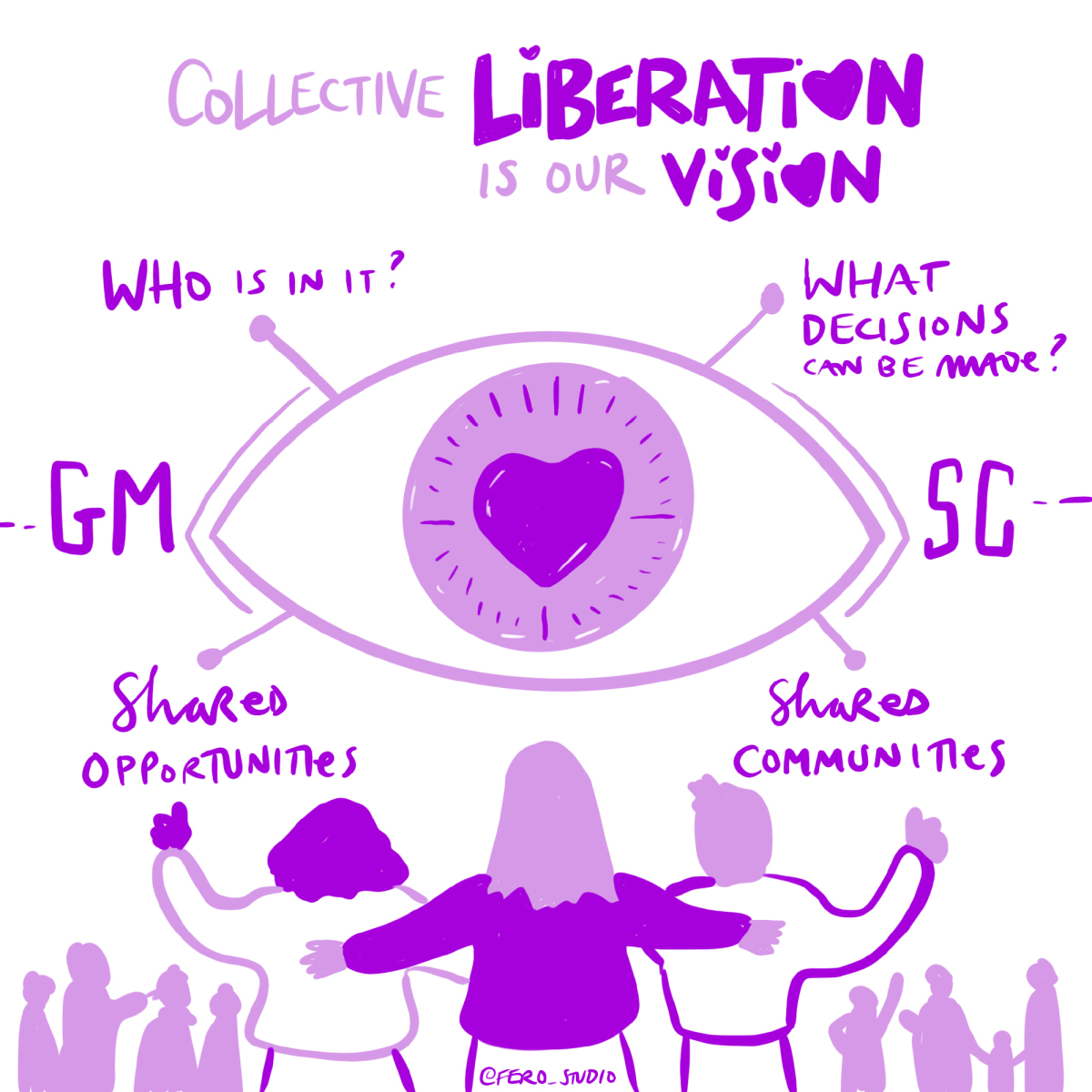Below are the definitions of some of the key words present in our mission and vision.
Abolitionist: Abolitionism is historically connected to the radical end of state punishment and slavery. State punishment includes ‘carceral institutions’ such as prisons, jails, immigration detention centres and policing structures. As we as a group centre abolitionism, we call for the work to radically reimagine and develop strategies for new ways of ensuring safety and security in our societies – whilst recognizing that we cannot accomplish that without really thinking beyond the oppressive structures and systems we already know. Abolition in our work, is a call to imagine and create new social, political and economic conditions/ ways of being with each other, that will render carceral systems obsolete, as well as the violence we produce and reproduce in our communities. We use this in our accountability, as when harm and disagreements surface, we want to see this as an opportunity to transform harm into learning and transformation, as opposed to punishment and exile. Our collective definition is also inclusive of us recognizing the need for abolition of all systems of oppression as opposed to a reformist approach. We are radically reimagining, resisting and creating the new. We practice this by how we are with each other.
Anti-capitalist: Capitalist ideology, promotes the belief in the superiority of the ruling class over the ‘worker’, and that people’s value is largely based on their ability to work and produce profit. As a collective, we recognise that capitalism is exploitation, especially in the ways that it’s pursuit for profit harms the planet, people and relationships. Being anti-capitalist, means we understand that everybody is entitled to safety, security and protection, where all of us matter regardless of our social and financial status or identity. Instead of us having our worth based in our ability to make profit, we know the importance of relationships that are built on community-care, and our investment in each other over financial gain.
Anti-racist: In simple terms, anti-racism describes the steps we actively need to take to combat racist ideology, beliefs and behaviours, whilst recognising our own roles within it, rather than passively claiming to be ‘non-racist’. Anti-racist work, has its roots in abolitionism, which means not just the end of racist acts or groups of people, but locates the problems in power and the need for substantial structural changes. Collectively, we will identify racist practices, behaviours and policies when we see them, take stock of power, privilege and positionality and’ invizibilise’ and address it. By this we mean we acknowledge the deeper systemic racist policies and principles that invade our daily lives, leading to the marginalisation of racialised people in all levels of society.
Anti-discriminatory: Discrimination, prejudice and dehumanization exists globally and incites hatred, intolerance and harm against individuals and groups based on their identity. This can exist along the intersected lines of racial and ethnic discrimination, xenophobia, LGBTQI+ people, gender, disability, class etc. Discrimination contributes to widening fear and societal rift, through our interactions, beliefs, behaviours and even cemented in national and international law. Discrimination occurs when a person/community is unable to enjoy their rights freely and safely. As a collective, we value anti-discriminatory practice, which involves recognising, respecting and supporting all folk, and actively challenge and eliminate discriminatory behaviour and practices, as well as systemic structural discrimination such as inadequate housing standards, access to education and the hostile environment.
Collective Liberation: this is the practice and acknowledgement of the principles we have set out, e.g. anti-racist, care, abolitionist etc. It recognizes that we are in a constant state of learning, unlearning, unfurling and becoming, in an ongoing process of self-reflection, including our own roles and biases in oppressive systems. By investing in ourselves and each other’s learning, we are acknowledging that the systems we are resisting and dismantling, exist within all of us, whilst challenging ourselves to be open a space of vulnerability that comes with it all. This requires us at times to lean in to a space of discomfort and challenge, recognise the needs of our minds and bodies and prioritise care
Reciprocity: reciprocity means a mutual exchange and benefit. For example, in issues related to climate emergency, we give back to the environment as much as we take from it, this can mean reducing our carbon footprint or promoting and supporting conversations in our communities and beyond about our reconnection with the natural world. In terms of our collective, it’s about how what we ‘put in’ should be for our mutual benefit, and creating value for all of us. As this work is as much about how we are together as what we build, very simply we treat each other with kindness, generosity and fairness – to expect the same in return.
Anti-Bureaucratic: Bureaucracy is generally defined as a rigid structure, with clear and fixed hierarchy, written rules and regulations – specifically linked to work, productivity, relationships and efficiency. However, this rigidity can stifle imagination and decision-making processes, leading to cliques and power imbalances, as opposed to community and mutuality. As a collective, we are anti-bureaucratic in our set up, with no one group of people having defined power over another. We engage in a culture of collective accountability, to one another and the mission and seek the value in interpersonal relationships built on trust and care.

